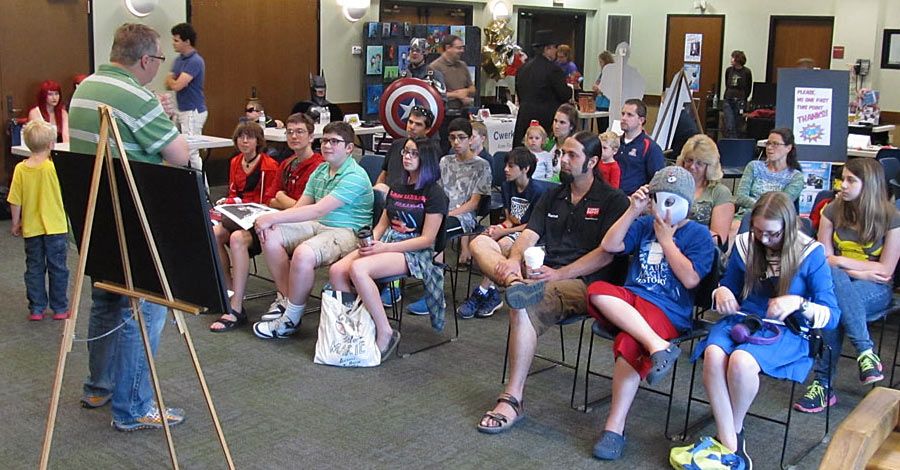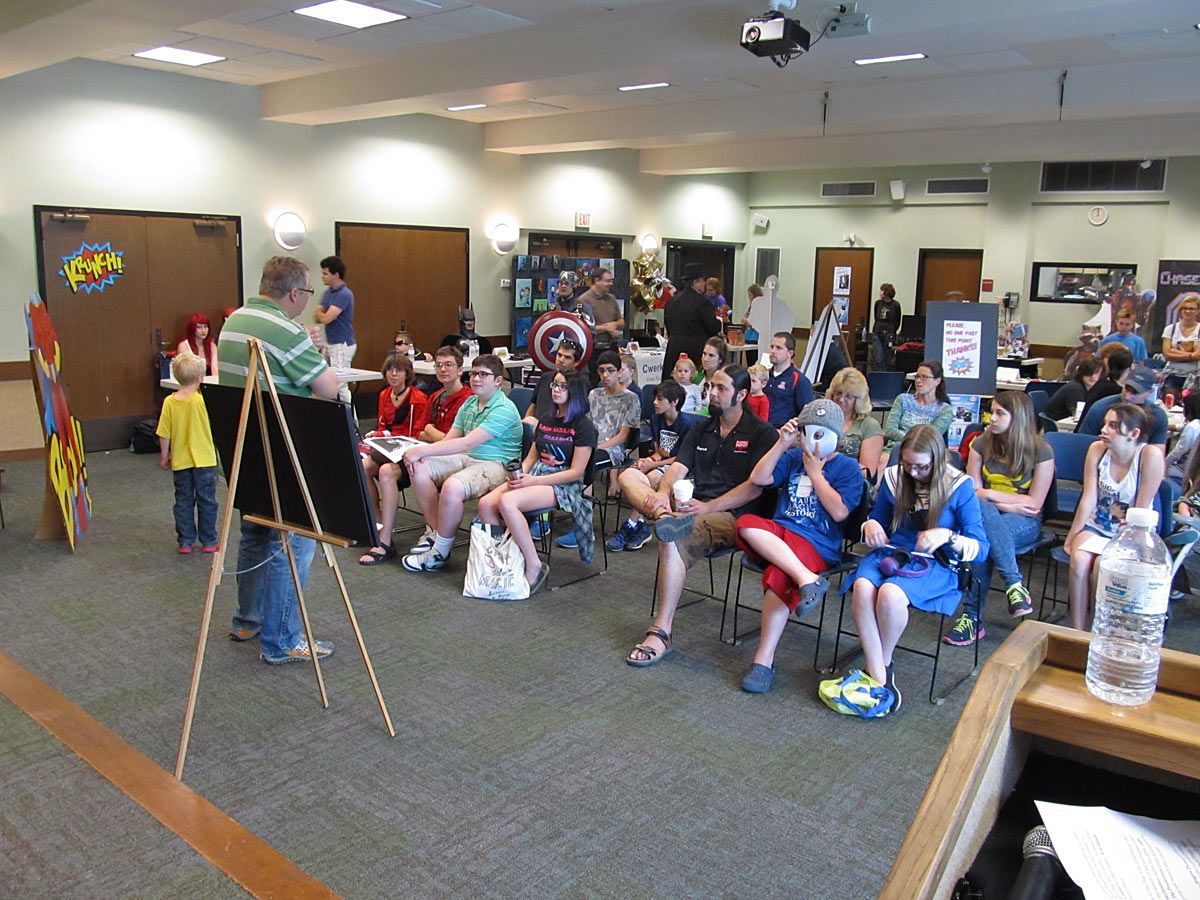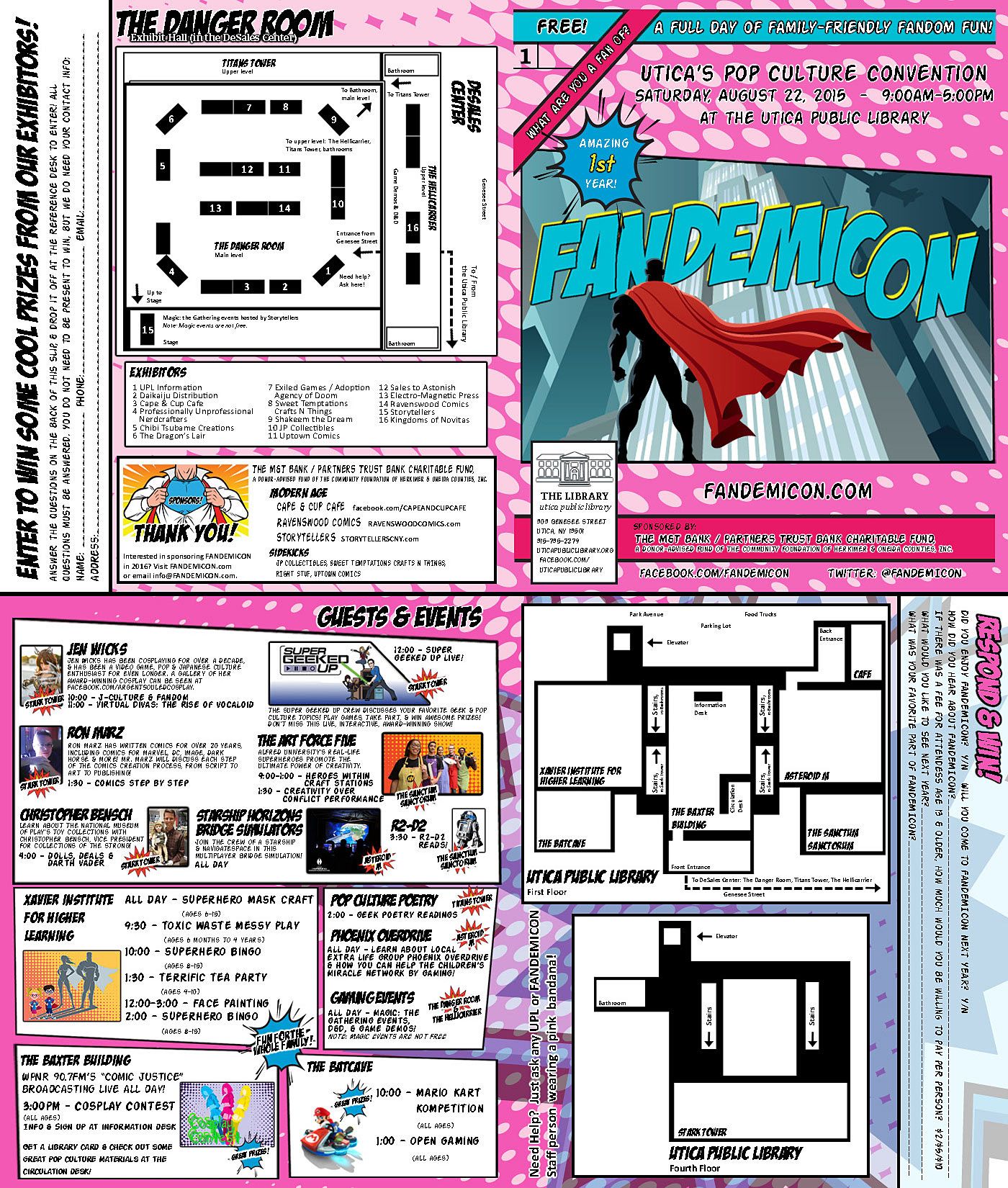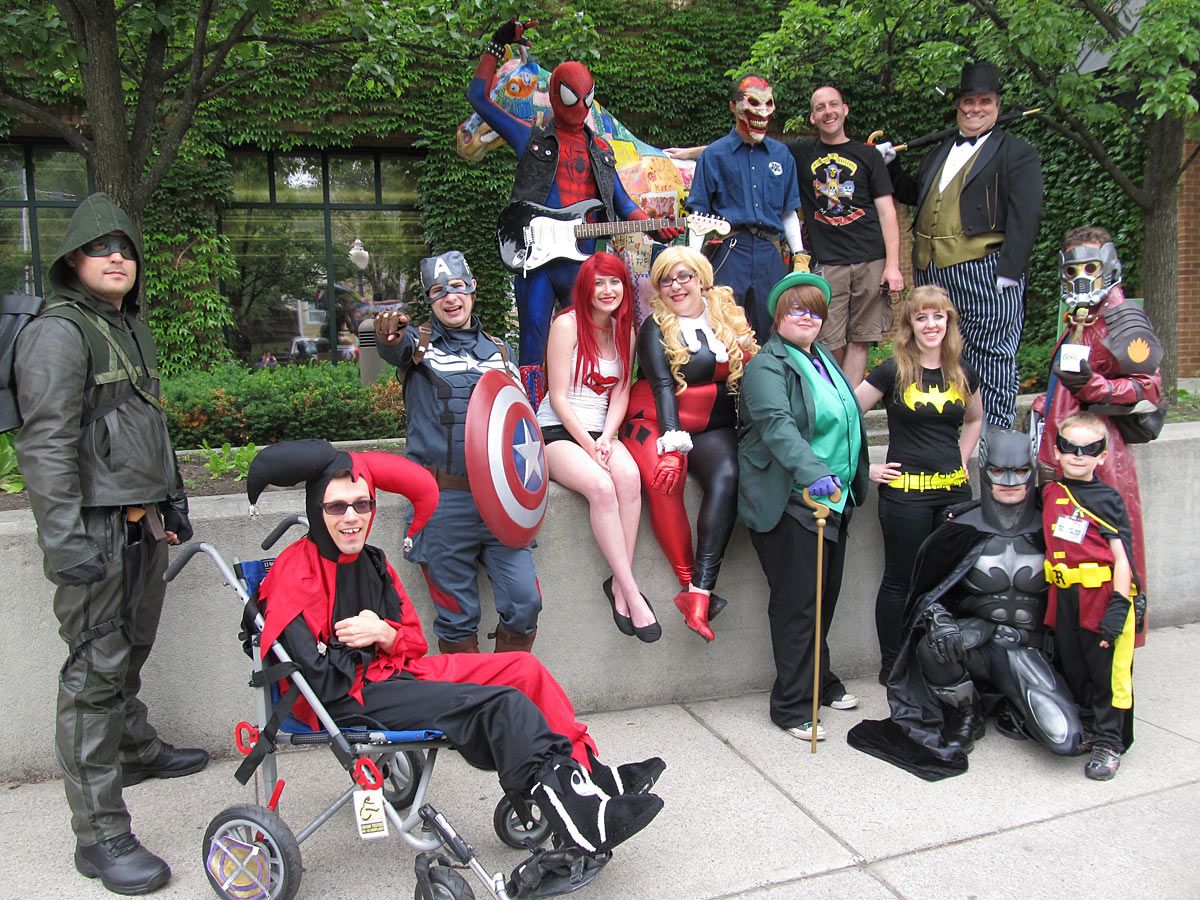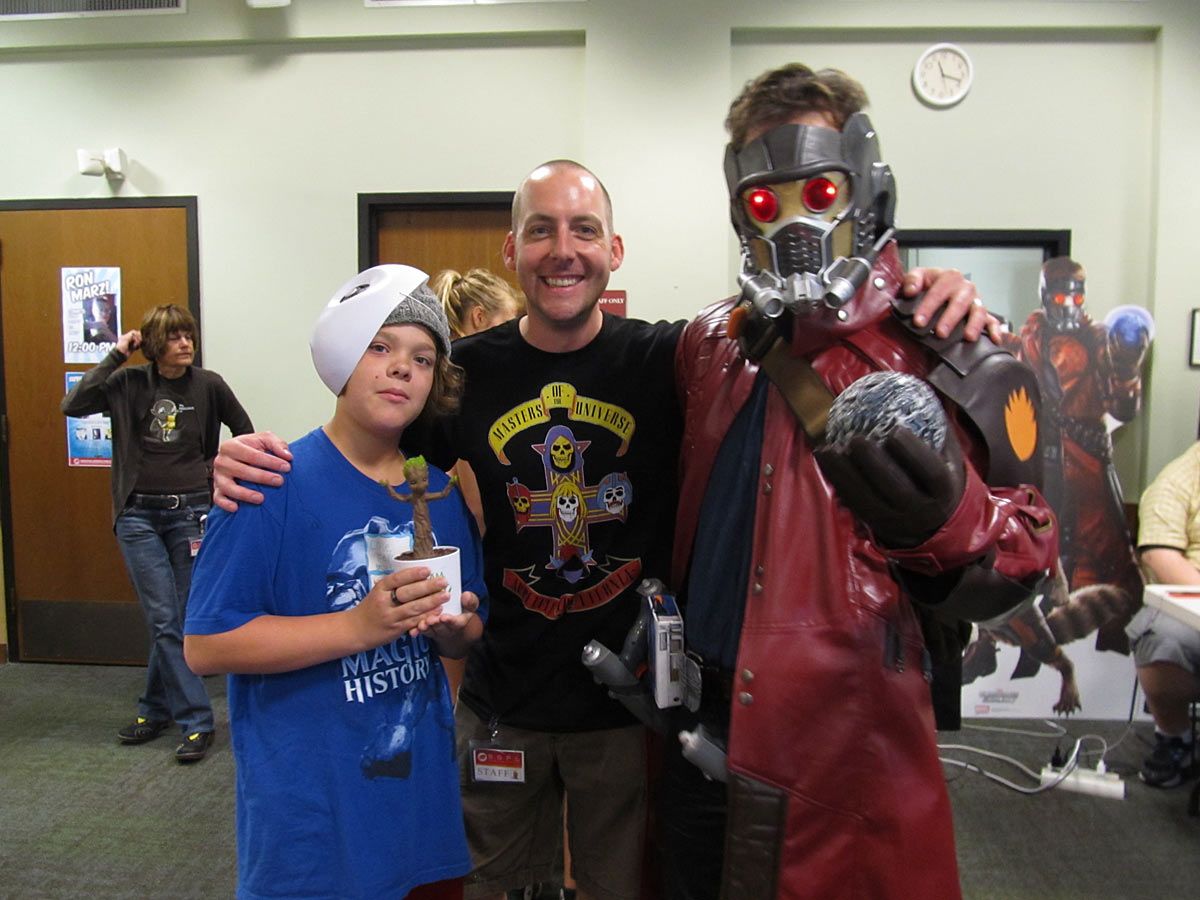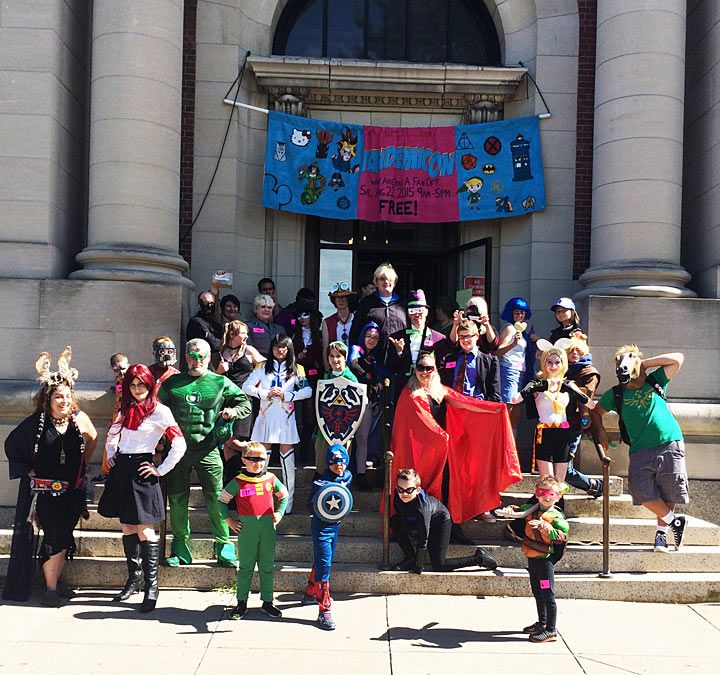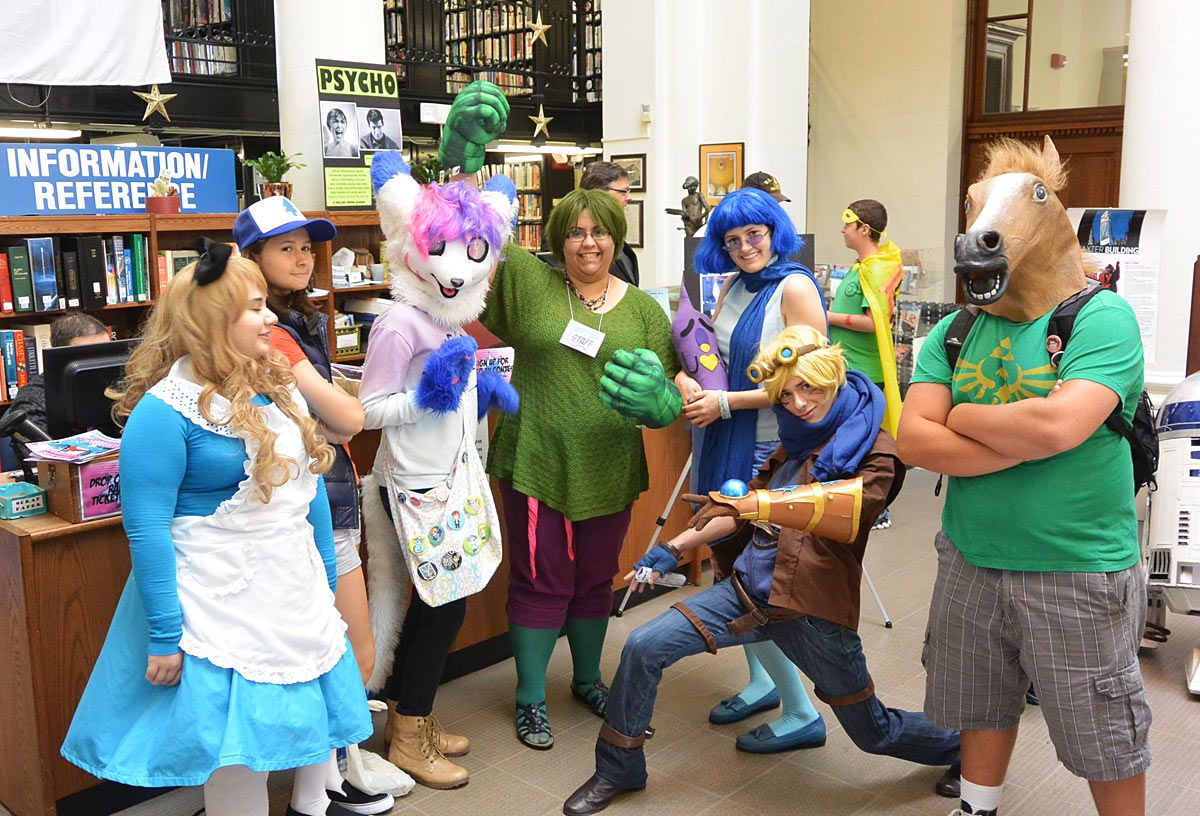Comics Conning Their Way Into Libraries
This summer, like most summers, I appeared at a few comic conventions. I also appeared at two libraries; not terribly unusual, as I've done a number of library lectures before. But these appearance were actually for comic conventions at the public libraries in Saratoga Springs, NY and Utica, NY.
The connection between libraries and comics is strong and growing stronger. Where comics might have been frowned upon in bygone eras, now many libraries sport well-stocked graphic novel sections. The bond is also expanding to convention-style events held at the libraries, complete with guests, cosplayers, vendors and more.
As comics in general and conventions in particular become part of the pop-culture zeitgeist, there's a growing trend of "library cons." I talked with Trevor Oakley, Teen Services Librarian at the Saratoga Springs Public Library, and Joshua J. Carlson, Director of Youth Services at the Utica Public Library, who put together the events I attended (and who also happen to be friends).
Ron Marz: How did you guys settle upon the idea of having a comic con at your respective libraries?
Trevor Oakley: At New York Comic Con 2014, I attended a panel presented by the Ann Arbor District Library in Michigan that outlined how libraries can successfully run their own comic and pop-culture conventions. It was really inspiring, to say the least. Soon thereafter, Caitlin Sheldon, our fandom guru on staff, approached me about doing a library con to kick off our summer reading programs. It was like things just came together so perfectly, and I knew I had a strong partner on staff to make this thing happen, and we went for it!
Joshua T. Carlson: At the American Library Association Annual Conference in 2014, and then again at the New York Library Association Conference in 2014, cons and/or book festivals were big topics for presentations. At the NYLA Conference, Trevor and I also put together the Pop Culture Round Table for the Association and it grew in membership and interest quickly, so pop culture, comics, fandom, etc., are all hot topics for librarians.
A con was something I had been kicking around in my head for a while, and the 2015 summer reading program theme was heroes and superheroes, so it seemed like a good time to do it. We usually do some sort of big celebration program in August at the end of the summer reading program. So instead of having a carnival-type event, I planned on our con to fill that role, albeit a much bigger event that our usual summer reading celebration.
Were either of you comic fans growing up, or are you now? What's some of your favorite material?
Oakley: As a kid, I was all about "Garfield" and "Calvin and Hobbes," but as I got older, I really got into reading "Batman" and "Captain America." When Image Comics hit the scene, I was all about "Spawn" and "Savage Dragon." Now, I mostly read horror comics, and have been following Dark Horse's "Conan" series from the beginning. Right now I'm really into what Image Comics is publishing. There's a lot of amazing, original, quality storytelling going on. I'll spare you the lengthy list of titles I'm reading!
Carlson: Ditto on "Calvin and Hobbes." I think there's a lot of people in our generation, particularly men, who were inspired by "Calvin and Hobbes." As a note, I had those black-and-white collected editions, and used them as coloring books. I still have every collection printed. As a teen, I actually wasn't a huge comic book fan, though I did buy certain titles. "WildC.A.T.S" is one that sticks in my mind. It was the first thing Image published by Jim Lee, and I remember being blown away by it. I saved those first issues forever, thinking that it was going to be like the first "X-Men" or "Avengers" in importance and value... ah, young naivete.
Also, Dark Horse started its run on "Star Wars"-related titles then, and the "Dark Empire" series blew me away. It is what got me into "Star Wars," as I was a bit young when the original films came out. From that point, I was hooked and read pretty much every novel that came out in the '90s. I'm far more into comics nowadays, and like Trevor, really feel like Image is where it's at. They are putting out simply stunning work. And, I have to give huge kudos to whoever on their staff does their trade cover design work. They are phenomenal -- eye-catching, interesting graphic design, and even while titles are vastly different, there's something about the cover design that makes them all Image.
One thing I did just read, however, that I absolutely loved was Mark Millar's "Chrononauts." Such a good book -- fun story, great art, plus I was impressed with how at the end of the trade they took the time to give bios and info about all of the people involved in the creation of the comic. That's classy, and not something you see normally.
From the outside looking in, it seems like comic events at libraries are becoming more commonplace. Is that your sense as well? And if so, why is that happening?
Oakley: Absolutely. Traditionally, libraries love and feel a kinship with artists, writers, and creative people, and over the past 15 or so years, have democratized public access to comics literature by developing graphic novel collections. In less lofty terms, libraries have forever been geeky, welcoming places to hang out! There's the explosion of geek culture, and the transformation of libraries from book repositories into community centers and event venues. Demographically, child geeks from the past few decades are now raising their kids to love comics. It all makes libraries and comic events a perfect fit.
Carlson: I think a lot of it has to do with the fact that traditionally speaking, libraries and librarians have not been very good at marketing themselves and what they, both the institution and the individual, have to offer. There's a movement to change that, just as there's been a movement to change the role of libraries in their communities. We have realized that we cannot survive if we don't market ourselves, if we don't tap into our patrons' and community's interests, if we don't form interesting partnerships with people, organizations and businesses, and if we don't keep the library relevant.
Pop culture stuff, and particularly geeky stuff, is currently trendy and "in." Libraries and the librarians who run them, by their nature, tend to be kind of geeky, but have had a falling out in terms of trendiness, no matter how welcoming we are to people. Cons and pop culture-related events are ways to embrace our and our patrons' interests, and transform that into interesting, fun, attention-getting events that drive people into the library. They allow people to see just how relevant libraries can be to their interests and lives.
The turnouts at your respective events seemed really good to me, with both devoted comic fans and people who didn't have as much familiarity with comics. Do you find these events attract both of those audiences?
Oakley: We had a decent number of walk-ins, who just happened to be in the library, stop in to the event. They seemed to have a good time, even though they may not have been fans of comics, or well-versed in them. The cool thing was that they got to experience an event like this without having to travel, spend money, plan, etc. It was just there, where they already were! They saw artists and writers in action, a lot of people in costume, people playing a variety of games, and other people like themselves having fun... in the library... because of comics!
Carlson: FANDEMICON brought in nearly 700 people. They were people who were excited that we were offering an event that aligned with their geeky interests. As a note, a lot of "regulars" didn't come that day, because we had shut down all of our computer services. So, based on the usual numbers for a Saturday in August, we can say that the event itself primarily drew the crowd, and that only a small portion were people who just happened to be there. Also, based on the usual numbers for a Saturday, we had a dramatic increase simply in people coming into the building. Let's just say that around 700 people is not a normal number, and is significantly more than usual.
On a tangential note, I also feel like that comics have transcended from being a niche market, or at least comic characters have. Movies and TV shows, especially the Marvel Cinematic Universe, have brought superheroes and comic characters to the masses. I personally feel like we, as librarians who are planning and hosting these kinds of events, owe those movies a lot of debt. Something like the "Big Bang Theory," and the media's change of tone from geek/nerd as negative laughing stock, to geek/nerd as positive protagonist, also has done a lot to allow geeks and nerds to be more comfortable in public arenas.
It's okay to be a geek or nerd or fanboy or fangirl now. In fact, it's finally cool to be one. Prior to the recent explosion of interest and the changes of perception, I don't think many communities and their libraries could have drawn enough attendance from the hardcore fanboys and fangirls to justify such an event. But since fandom and geek/nerd culture has gone mainstream, it makes these kinds of events viable.
So what went right at your events, and what didn't go as planned?
Oakley: Because our event wasn't huge, there was a lot less that could go wrong! We were thrilled with the overall turnout, and from the feedback we received from attendees, they want more and bigger events like this. We also wanted to make our presenters feel like they were well taken care of, keeping them fed and watered to show them how much we valued their being a part of the event. And, Ron, feel free to correct me, but from what you and others told us, I think we did an okay job with that! As far as things that didn't go as planned, they were minor, and I don't even remember the specifics.
Carlson: People were astounded, amazed, overjoyed at the event. Everyone wants us to do it again. The library's staff was phenomenal and was a unified, happy team throughout the day. We saw the positive impact we were having. It was a fun event for people of all kinds, and all ages. We did have some birthing pains with our inaugural event, most notably the way the exhibit hall was set up, and the number of panels/presentations we held. For the next time, my plan is to shorten the event by an hour on either end, and change where the exhibit hall is located.
What are the positives that come out of this kind of outreach, both for the library and comics in general?
Oakley: Hopefully, people that came for the event, who maybe hadn't been in a library for years, had a lot of fun and also saw what else we had going on, both on the shelves and on our event calendar, and that it made them want to come back for more! One of my regulars came up to me after having a really great time at artist John Hebert's table, exclaiming, "Dude! I gotta get into comics!" It was the perfect time to remind them we have a large collection of graphic novels and trade paperbacks, and happen to have a great comic shop like Comic Depot in town! So I really hope people who attend comics events at libraries start checking out things from their library, and maybe hop on a comic shop locator to find a store.
Carlson: We introduced the library to a lot of people. Many
remarks were along these lines: "I've never been here before, I can't believe how amazing this is!" and "I haven't been here in many years, this place is doing so many cool things now!" I'll paraphrase, but the winner of our cosplay contest, a male teenager, thanked us -- the library and the attendees -- for doing the event, and for being so inclusive. I think we built a lot of capital up with people that didn't really have us on their radar before, both regular community members, as well as VIPs, so to speak, like media reps, politicians and community leaders. The event created some momentum for moving forward with more geeky, pop-culture, fandom programming.
Back in my days at CrossGen Comics, library sales were a definite sales focus of the company. Do either of you have a sense that the library market is being courted by publishers?
Oakley: Oh, yeah. I get packages from DC Comics a few times a year with posters, bookmarks, and a catalog. Plus, they have provided us with materials and giveaways for the past couple of Batman Days. Comics publishers have also been in attendance at national library conferences, too.
New York Comic Con, which wouldn't exist without comics publishers, has always considered librarians as "industry professionals," allowing us to purchase Pro badges to attend the con and do some networking. Baker & Taylor, a huge library vendor, publishes quarterly graphic novels newsletters, in hopes libraries buy more comics from them. So, yeah, they know we're here!
Carlson: More and more so, and it's spreading to other "geeky" areas, as well. Game publishers are starting to also see libraries as a vital market, as tabletop-based gaming and libraries are a perfect fit for one another, just as comics and libraries are. That being said, I do think there's more that could be done to court us librarians, and make things a bit easier. There's a lot that can be said about how graphic novels are cataloged, which is an issue on the librarian side. But the way publishers title things, and alter series runs, makes things complicated. The way they collect issues is also an issue for us sometimes, especially when looking at major crossover events. I'd also love to sit down with publishers and talk about the physical construction and binding of their trades and graphic novels.
Do you see your library doing an event like this again?
Oakley: Definitely! Plans are in the works for another big event in the spring or early summer. I'm attending comic events now with a different mindset, enjoying both vendors and panels, but also working to connect with people in the industry who are interested in doing library events.
Carlson: Absolutely. Trying to maintain the momentum we started building, I'm having all of my staff start doing more pop culture-related programming, and our adult services department is looking into ways to do the same. In addition, FANDEMICON 2016 planning is already underway with some cool new ideas, including a fan art contest and VIP event the Friday evening before. Save the date for Saturday, August 20 at the Utica Public Library. The con's site,www.FANDEMICON.com, will be getting updated soon, and the Facebook page is a great place to find out more info, ask questions, and stay in touch: www.facebook.com/FANDEMICON.
There's one more library appearance on my calendar for the year: Saturday, Dec. 5 at the Guilderland Public Library in upstate New York. But this one isn't just another library con, it's a "Star Wars"-themed event in anticipation of "The Force Awakens" being released. I'll be doing a presentation on comics in general, and my "Star Wars" work in particular. There will also be vendors, trivia, a costume contest, children's events, and costumed appearances 501st Legion members. Buzz about "Star Wars" should be at an all-time high by December, so hopefully we'll have a packed house. See you there... and may the Force be with you.
Ron Marz has been writing comics for two decades, and thinks it's pretty much the best job ever. His current work includes "Witchblade" and the graphic novel series "Ravine" for Top Cow, "The Protectors" for Athleta Comics, his creator-owned title, "Shinku," for Image, and Sunday-style strips "The Mucker" and "Korak" for Edgar Rice Burroughs, Inc. Follow him on Twitter (@ronmarz) and his website, www.ronmarz.com.

